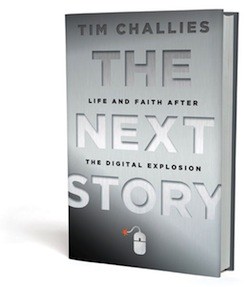 If anyone has the unique experience and voice to write about 21st Century digital life, it is author, blogger, and pastor Tim Challies. Tim is a sort of godfather of the digital age, especially the digital church. He has emerged as a leading voice as the proprietor of one of the most widely read Christian sites on the Internet: Challies.com. Besides this, he has launched a unique publishing company, Cruciform Press, and has authored several important books, including Sexual Detox and The Discipline of Spiritual Discernment.
If anyone has the unique experience and voice to write about 21st Century digital life, it is author, blogger, and pastor Tim Challies. Tim is a sort of godfather of the digital age, especially the digital church. He has emerged as a leading voice as the proprietor of one of the most widely read Christian sites on the Internet: Challies.com. Besides this, he has launched a unique publishing company, Cruciform Press, and has authored several important books, including Sexual Detox and The Discipline of Spiritual Discernment.
The Next Story is, in many ways, a serious study and theology of the digital revolution. This is a unique and important book for many reasons, mainly because Tim goes behind the pendulum swing between warning and triumphalism in assessing our digital age. He presents a sober and hopeful theology of all things digital.
Written in six easy-to-read chapters, Tim presents a history, an objective analysis of life today in the digital world, and thoughtful and practical analysis of the impact of digital tools upon our world. I want to give a brief description of each chapter and then sum up my thoughts on the book at the end.
Chapter One: Discerning Technology. In this chapter, Tim shares a definition of technology and reminds us that it is not neutral. He says technology has a mandate, a morality, and a heart. He gives powerful and concrete evidence that technology is not amoral. It has a message.
Chapter Two: Understanding Technology. Perhaps this is the more important chapter. The big takeaway for me is that we don’t fully realize the impact of new devices in our lives—what impact, what cost, what will they take away when they are present.
Chapter Three: A Digital History. Tim gives a very thorough history of advancement, not simply of the computer and the Internet, but the entire age of Information, the rise of the image, dawn of the digital, and conquest of the digital.
Chapter Four: Speaking, Truthing, and Loving. Tim tackles communication, charting its growth from the invention of the printing press to the modern era, sharing both negative and positive benefits. He also charts the effects on human kind, the shrinking of the world, and other sociological effects on the new and emerging communication tools.
Chapter 5: Life in the Real World. Tim answers the question, “What is Media?” This was an immensely practical chapter. My biggest spiritual takeaway is that media is only a medium, it stands only as a substitute for intimacy. When we prioritize media over real-world relationships, we lose something. Powerful stuff.
Chapter Six: Turn off and Tune In. Tim opens up about his own struggle with distraction. It’s a new phenomenon of our age, that lights and beeps and pings constantly interrupt our flow of work and life. How do we manage distraction? What impact does this have on our brains and our hearts, and how does a Christian live this out in the 21st Century?
Chapter Seven: More is Better. An immensely useful chapter. Tim goes to the heart of our obsession with technology. It’s really not about saving time, but about having more, about the lust for the new. How do Christians grow in wisdom and manage the real-world expectation of keeping up and having more and better devices?
Chapter Eight: Here Comes Everybody. Tim tackles the “wiki-ization” of truth. He contrasts the old Encyclopedia Britannica model of information gathering with the Wikipedia model. Some sobering thoughts about the way we acknowledge and attain truth and information.
Chapter Nine: Seeing and Being Seen. This was a very sobering chapter on the sacrifice we make. We give up much information in exchange for convenience. Where will this all lead and what does our “digital trail” say about us?
Tim then ends with a helpful epilogue, summarizing the lessons we learned in the book. I found this book to be incredibly stretching and sobering and yet hopeful. Perhaps the biggest and most important takeaway is that each new piece of technology we put into our lives has a net effect. Have we weighed the consequences? Have we considered the impact on our relationship with God? What is the theological statement?
I highly recommend this book and suspect it will be a textbook in Christian colleges and for influencers who wish to educate this generation on life in the digital world.







My wife and I listened to the audio version of this book. Tim raises some great points about how the digital age has changed how we communicate.
My husband and I read this book together and both enjoyed it. It contains lots of practical, food-for-thought. Thanks for sharing your thoughts!